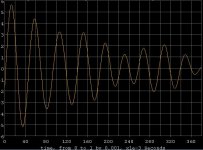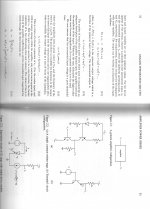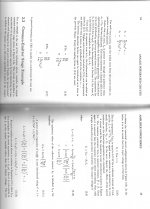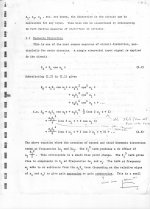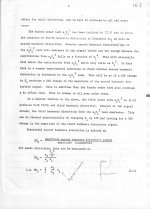"Werner Heisenberg lived here..........probably."
Could someone remind me of the mean free path for electrons in, say, normal electrical copper? How far from the BQP would they have to travel before all beneficial effects are lost? Mean free time too?
The late (lamentably!) Peter Carroll Dunn has a short table of properties of materials on the front pastedown of his Gateways Into Electronics, which includes the mean free time of electrons in copper, tau sub F, as 2.4 * 10^-14 s, and the average thermal speed of electrons along one axis <|u|> as 5 * 10^6 cm/s [ EDIT: at 290K ]
I have to plug this book again as it is just astonishingly good. ISBN 0471254487.
Last edited:
Even harmonics are present when waves are non symmetrical. Such an asymmetry adds a DC component.
George
No! There is no way to add pure sines and cosines algibraicly to create DC. There has to be explicit DC present or modulation/non-linearity.
You obviously were already convinced beforehand that there will no differences to be heard, so the outcome of your test (blind or not blind) was to be expected.
That's a reasonable comment. I was only interested in the measurements to verify or refute specific fact-claims; the listening "tests" (I use scare quotes because I didn't do enough to have this rise to the level of what I'd consider a test) were only for my own curiosity, and I didn't say anything about them until I was pressed about it.
when they show the Cramer-Rao boundary for the stimulus on the same plot we get excited
They wouldn't hear of it.
He died too soon?
It's hard to tell.
Where's the naysayers when the chips are down? they're off hiding. readying to attack again, no doubt.
No in fact as several of us pointed out, non-linear processing is not subject to this "uncertainty principle". As to hearing specifically this has been studied since the 70's.
"Fourier uncertainty principle" is not a term you see often, to me this is a deliberate association with Heisenberg purely for sensationalism.
"Fourier uncertainty principle" is not a term you see often, to me this is a deliberate association with Heisenberg purely for sensationalism.
I found it very useful for pedagogical purposes when I taught basic QM- my students intuitively grasped the concept of how long it would take to use beat frequencies to tune a bass; from there, going to quantum uncertainty was a much smaller leap.
human-hearing-is-highly-nonlinear
Uncertainty principle - Wikipedia, the free encyclopedia
"In the context of signal processing, particularly time–frequency analysis, uncertainty principles are referred to as the Gabor limit, after Dennis Gabor, or sometimes the Heisenberg–Gabor limit."
Uncertainty principle - Wikipedia, the free encyclopedia
"In the context of signal processing, particularly time–frequency analysis, uncertainty principles are referred to as the Gabor limit, after Dennis Gabor, or sometimes the Heisenberg–Gabor limit."
What you hear could depend on what your hands are doing
"These results also demonstrate the interaction between motor systems and perception. It's really pretty amazing. Imagine you're waving an American flag while listening to one of the presidential candidates. The speech will actually sound slightly different to you depending on whether the flag is in your left hand or your right hand."
"These results also demonstrate the interaction between motor systems and perception. It's really pretty amazing. Imagine you're waving an American flag while listening to one of the presidential candidates. The speech will actually sound slightly different to you depending on whether the flag is in your left hand or your right hand."
I found it very useful for pedagogical purposes when I taught basic QM- my students intuitively grasped the concept of how long it would take to use beat frequencies to tune a bass; from there, going to quantum uncertainty was a much smaller leap.
My texts are old, we only used the Gabor limit restricted to time and frequency as the conjugate variables. So maybe I'm mistaken about their choice of words, I just have not used it that way in the past.
If you google it in quotes that article and references to it dominates the first few pages, not that that means anything.
Go to it, Gapapag. I'm too tired to correct Scott of the DC offset thing.
Just a few terms start making an "asymetrical waveform", I could add more and get it even stronger. There is NO DC here. What are you trying to say, that you can add terms of sin(awt+phi) and get a DC value? Or maybe you can highpass filter a waveform and retain the DC component?
Attachments
Last edited:
OK, I will put the text up: Look at B(0), where B1 is the fundamental.
You're putting waveforms through a non-linearity, you obviously don't understand what I'm talking about.
The uncertainly apply to quantum mechanics. But, following the Plank's theory, you can set an equivalence in the wave theory. That's why, and as previously demonstrated, washing electrons clean the audio signal."In the context of signal processing, particularly time–frequency analysis, uncertainty principles are referred to as the Gabor limit, after Dennis Gabor, or sometimes the Heisenberg–Gabor limit."
If you apply the same principles to the matrix (the BQP itself) you can easily demonstrate that the efficiency of a quantum filter is, with a small uncertainty factor, a logarithmic function of its purchasing price.
Last edited:
- Status
- Not open for further replies.
- Home
- Member Areas
- The Lounge
- John Curl's Blowtorch preamplifier part II
